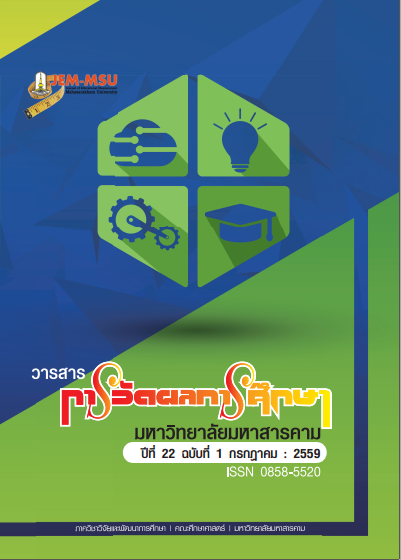The Development of Learning Activity Model to Enhance for Public Mind of Prathomsuksa 6 Students
Main Article Content
Abstract
This study purposes were : to develop the learning management model to enhance
public mind for Prathomsuksa 6 students; to evaluate the effectiveness of that learning
management model to enhance public mind for students, and to compare the public mind
of those students between before and after providing of activities with learning management
model. This research was conducted by using methodology of the research and development
approach. The samples for this study consisted of 40 students from schools under the Office
of Ubonratchathani Primary Educational Area 4, in the academic year of 2013. The instruments
were used in gathering data were : a teacher’s interviewing form for investigating of current
state of problems and needs for providing learning activities to promote the students’ public
mind; the handbook for learning management to enhance public mind accompany with
model; the teacher’s assessing form of the students public mind, composed of 15 items
with discriminating power ranging 0.64–0.85 and a reliability of 0.82 ; the self-assessing form
of student’s public mind, composed of 30 items with discriminating power ranging 0.62 –
0.88 and a reliability of 0.62 ; a 20 item-scale of questionnaire for investigating of the
students opinions about learning activities under that model, with discriminating power
ranging 0.60 – 0.82 and a reliability of 0.84 ; the recording form of students’ behaviors those
revealed for the public mind; the teacher’s interviewing form for gathering opinions about
using learning management model, and the parent’s interviewing form for asking about
managing activities to support the students’ public mind. The statistics were used in data
analysis consisted of mean, standard deviation, percentage and t-test (Dependent Samples).
The results of the study were as follows :
1. The results of developing for learning management model to enhance the
student’s public mind found that, the components of learning management model were
comprised of; 1) the principles of model, 2) the model’s objectives, 3) the activities of
learning process, 4) the roles for teachers and students, and 5) activities for assessment.
Whereas, the process of learning activity comprised of 5 stages thus were : 1) engagement of
self-awareness, 2) encouraging of self-concept, 3) providing of purpose and desired behavior,
4) supporting for self-regulation and performing, 5) reflecting and improving of performances.
2. The result of effectiveness evaluation for learning management model, were
found that the students obtained in performing activities corresponded to that model at a
high level. According to the reporting themselves for obtaining the public mind with clearly
and continuously. For the result of assessment students public mind based on their teachers
found that those students had public mind in overall at a high level, and the result of
teacher’s opinions in qualities and appropriateness of learning model, were appropriate and
successful in implementing. Whereas, the reflection for learning management of the parents
perception found that it was appropriate and could enhance the students’ public mind at a
high level.
3. The participant students who learned based on learning management model,
showed higher public mind after providing of learning activities than before learning, for
overall and in each aspect of public mind at the .05 level of significance.
Article Details
The content and information contained in the published article in the Journal of Educational Measurement Mahasarakham University represent the opinions and responsibilities of the authors directly. The editorial board of the journal is not necessarily in agreement with or responsible for any of the content.
The articles, data, content, images, etc. that have been published in the Journal of Educational Measurement Mahasarakham University are copyrighted by the journal. If any individual or organization wishes to reproduce or perform any actions involving the entirety or any part of the content, they must obtain written permission from the Journal of Educational Measurement Mahasarakham University.


